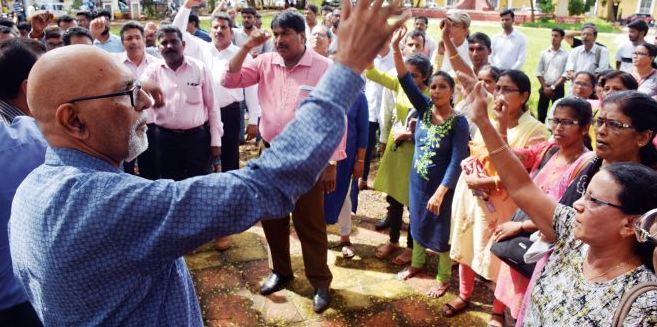Goa is abuzz with excitement as vintage bike and car owners, users, collectors and fans are decking […]

‘MERGERS OF BANKS ARE MURDERS OF BANKS’
Banking, Nov 09- Nov 15 2019 November 8, 2019GO STAFF
The functioning of banks in the state was affected on Tuesday, October 22, due to a 24-hour strike undertaken by bank employees to protest against the government’s decision to merge 10 public sector banks (PSBs) into four bigger banks to make them big enough to compete in the international arena.
Although the employees of State Bank of India (SBI) did not join in the strike, banking operations were hit due to the participation of the employees of the several large PSBs such as Bank of India, Canara Bank, Corporation Bank, Bank of Baroda, Syndicate Bank and Oriental Bank of Commerce.
The strike call was given by the All-India Bank Employees Association (AIBEA) & Bank Employees Federation of India (BEFI) for the following reasons:
To stop the mergers of banks
To stop retrograde banking reforms
To push for recovery of bad loans and stringent action against defaulters
To protest harassment of customers with penal charges and the increase in service charges
To increase the interest rate on deposits
To stop the attacks on jobs and job security
To push for adequate recruitment in all banks
Likening the merger of banks to the murder of banks, the Goa Bank Employees’ Association (GBEA) through AM Pereira, general secretary and spokesperson, explained the reasoning behind the protests against mergers.
Merger of banks is murder of banks
The GBEA pointed out that Finance Minister __, in a big bang announcement, informed the nation that 10 Public Sector Banks (PNB, Canara Bank, Union Bank of India, Indian Bank, United Bank of India, Allahabad Bank, Syndicate Bank, Corporation Bank, Oriental Bank of Commerce and Andhra Bank) would be merged into four Banks — i.e. six banks would be closed. He said the government may call it a merger but in reality it is the cold-blooded murder of the six banks because after the merger, these six Banks which have been built up over the years, would disappear from the banking scenario.
Nationalised Banks – pillars of our economy
Banks were nationalised in 1969 with the very clear social and economic objective of broad-basing the economy and its development.
The GBEA said that in the last 50 years, the nationalised banks have made a phenomenal contribution in building up a strong economy with a visible social orientation. 8,000 Branches have become 90,000 bank branches today, out of which 40,000 branches in located in rural and semi-urban areas which were earlier neglected.
Credit to priority sector has boosted our economy resulting in achievements like green revolution and white revolution, industrial progress, job generation, rural development, etc. In 2008 when the entire globe was facing financial turmoil and banking tsunami, the Indian banking system was safe because of our public sector banks.
Govt says it wants sabke saath, sabko vikas but cuts the lifeline to prosperity
The Government talks of prosperity for all but by closing down these six banks, six main arteries of the banking system are being cut off. The victim banks, viz. Allahabad Bank, Andhra Bank, Corporation Bank, Syndicate Bank, United Bank of India and Oriental Bank of Commerce are very good banks and have catered to the economic development in the respective geographic areas in a big way. Suddenly deciding to close these banks is inappropriate and unwarranted.
The merger of banks is a diversion from the economic crisis
The country is facing serious economic slowdown and downturn. Banks with their huge resources at their command can play a decisive role to revive the economy. In fact, only last week, our FM has assigned important jobs for our bank in boosting the economy. The decision to merge and close banks is a total diversion from these tasks.
Merger is no panacea for problems faced by banks
Banks face problems due to huge pile of bad loans. While the Public Sector Banks made a total gross profit of 150,000 crore for the year ended March 31, 2019, because of total provisions towards bad loans, etc amounting to2,16,000 crores, the banks ended in a net loss of `66,000 crore. Can anyone believe that merger of banks will result in recovery of the huge corporate bad loans? Rather, as we have observed after merger in SBI, bad loans in SBI has gone up. Same risk is facing these banks now.
A bank which could not detect the Nirav Modi fraud for many years will not be more effective if it becomes bigger
In fact banks, if they become too big, cannot monitor their business effectively. For example, PNB, could not realise that Nirav Modi was cheating their bank for many years. If banks will become further big, it will become more difficult to monitor bad loans and frauds when frauds are already on the increase.
Big banks are not automatically strong banks:
Too big to fail has been thoroughly proved wrong when in 2008, many big banks all over the world collapsed like a pack of cards. Big bank means big risk, because the big bank can give big loans and take big risks and ruin the bank. What India needs is strong and people-oriented banks and not necessarily big banks.
In India Banking density is low, we need expansion, not consolidation
Everyone knows that in India, banking density is much low compared to many countries of the world. Thousands of villages are still unbanked. Our banks need expansion and not amalgamation. There is a huge space for banks to expand and reach the people. When we need more branches to be opened, merger of banks will result in closure of large number of branches. We have seen after merger in SBI that 7000 branches were closed down. In this proposed merger, the closure of branches will be much more. It will be most unwise to reduce the branches in the country. Hence Banks need to be expanded. There is no need for consolidation.
India has a large space for further banking expansion
The number of Banks in USA with just 323 million population is far more than Banks in India with a population of 1.35 billion. India is not overbanked. There is no need for consolidation.
India needs financial inclusion, merger will exclude small people from banking map
Because banking has not reached all people, Government launched Jan Dhan Yojana. Now they have launched Jan Dhan Yoja II. This means we are yet to reach all sections of people. So we need to expand banking services. Mergers will result in shrinkage of banking. Hence there is no need for mergers.
India needs good banks, not big banks
Mergers are proposed to make our banks bigger to cater to increasing demands for large-sized loans. Bigger the loan, higher the risk. Already banks are suffering from big corporate defaults. Hence banks should not be made bigger by merging them. Hence mergers are not needed.
Big banks will help big corporates, not the common man:
There is another side effect of merger and making our banks bigger. Big banks will tend to cater to big corporate customer and would tend to ignore the common man. This will defeat the social orientation and objectives of nationalised banks.
Merger will not make banks stronger:
Government argues that banks would become stronger by mergers. There is no evidence to this conclusion. Two years ago, six banks were merged with the SBI with this argument. But the SBI has not become any bigger. Rather, the problems of the SBI have become bigger. Branches have been closed. Staff have become surplus. Business expansion has slowed down. NPAs have gone up. Thus banks will not automatically become big by merger of banks.
Mergers will reduce or close branches and shrink banking services
Mergers will surely end in closure of branches. Closure of branches would mean more number of customer going to lesser number of branches and banking services would be severely affected. Customer population per bank branch will increase and affect efficient customer service.
Mergers will surely result in closure of branches, whereas we need branch expansion to make banking accessible to all. Mergers and branch expansion are anti-thesis.
Minister of State for Finance Shiv Pratap Shukla, replied in Parliament on December 21, 2018, that 6,950 Branches have been closed and merged due to merger of Associate Banks with SBI.
Globally big banks is a myth
The argument that by merging our banks, they will become globally big banks and globally competitive, is a mere myth. The earlier belief that ‘too big to fail’ has become a myth now after the US banking crisis. Big banks have collapsed like pack of cards. Thus big banks mean bigger risk. India cannot afford to take such risks. Even all our banks are merged into one bank, the capital base would be around $4 billion whereas most of the global banks operate with capital base of $60 b, $70 b, $80 b, etc.
More bad loans in SBI after mergers
Mergers are proposed so as to resolve the problems faced by the banks. Bad loans are the main problem facing the banks. Can anyone believe that merger will result in recovery of bad loans. Obviously not. After the merger of six Banks with SBI, the NPA went up. Hence it is also a wrong presumption.
Merger will not help to recover bad loans:
Merger of banks and consequent issues arising from such mergers will put the issue of bad loans in the backburner. This is what happened in SBI after merger of 6 Banks with SBI. Hence Banks will further suffer.
Merger of Banks will cut into employment opportunities
In our country, where unemployment is a serious problem of the youth, Banks have been providing employment to thousands of educated youth every year. If Banks are merged and branches are closed, intake of staff will come down and hence employment opportunities will be seriously affected.
Don’t divert public attention from NPA to mergers
To resolve the problem of bad loans facing the Banks, Government should take tough measures to recover the bad loans. Instead of that, the Government is trying to divert the attention and focus by resorting to merger of banks which is unwarranted. Bad Loans in the 10 Banks proposed to be merged today are Rs. 3,16,632 crores. Whether these bad loans will automatically be recovered if these Banks are merged ?
Real agenda is to help corporates
Big banks will only help big corporates. It is obvious that the government, in the name of banking reforms, wants to enable the banks to help corporates.
SUCCESSFUL STRIKE
Officers of striking banks were not a part of the strike, however, they offered ‘silent support’ with the result that regular banking activities were affected and clearing of cheques could not take place.
The All India Trade Union Congress (AITUC) also supported today’s strike of bank employees.














